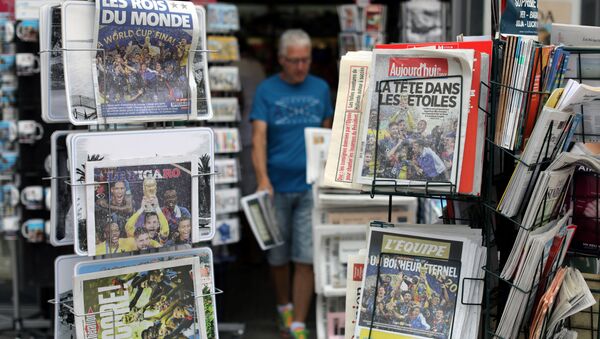The rejection of the two bills had pleased Senator Roger Karoutchi from the Republican Party. In an exclusive interview with Sputnik France, the senator said, “I am very pleased with this decision. I think that this is a dangerous and inadequate draft law. You cannot give ‘authority’ the power to decide which information is well presented and which is not. All this is again done in the name of political correctness and conformism.”
Roger Karoutchi is not the only one who believes that the laws concerning "fake news" can lead to arbitrariness. Many politicians have expressed their disagreement with such legislation; for example, the deputy and leader of the La France Insoumise Party, Jean-Luc Mélenchon, who published an article on his blog in June, in which he pointed out the danger of such bills for democracy: ["Russia's" Russia " Today "and" Sputnik ", the power puts all sites under attack."]
Nevertheless, the bills will return to the National Assembly for reconsideration, since the faction of the party ["Forward, the Republic!"] is the majority faction, so these bills can be adopted again without any changes.
Similarly, Senator Alain Houpert from the Republican Party in an exclusive interview with Sputnik France expressed his confidence that "it is necessary to punish for fake news," but freedom of speech should not suffer at the same time.
"I have questions: what is fake news? Who will decide? Who will analyze it?” Houpert said. "These laws put democracy in an uncomfortable position. The situation in our country is so bad and we are only a step away from these laws to start muzzling people’s mouths. Do we really want to return to the times of Galileo and Copernicus? I do not want our democracy to become a [democracy.]
Maurice Leroy, vice president of the National Assembly of France and MP from the UDI (SNID) party, also shared his opinion with Sputnik regarding the bill.
“On social networks there is a lot of misinformation, and at the same time you need to be careful, since it concerns freedoms – individual, public, fundamental freedoms. … The Senate – in the French tradition and especially since the time of General de Gaulle – has always been the main defender of public and individual freedoms, the freedoms of our fellow citizens,” Leroy said.
He went on to say that he was not surprised at all about the Senate Legislation Commission’s decision. Of course, it will be necessary to see whether the Senate will support the decision taken by the commission.
“However, even if the Senate rejected the ‘fake news’ bill in any case, the last word would go to National Assembly, and the majority of deputies support the French government on this issue,” Leroy said.
According to him, one must be able to combine the necessary struggle with "fake news" with freedom, because freedom is also needed in social networks and it is often very difficult when it comes to social networks, in particular Twitter. “So you need to find a balance. I hope that the National Assembly will be able to find this balance,” he said.
“This centrist political family was personified by Valerie Giscard d'Estaing, who was president of the French Republic from 1974 to 1980…. UDI has not yet voted on this law in the National Assembly. Our party rather shares the position of the Senate Legislation Committee, of which you spoke. We are in favor of finalizing this bill, we, the centrists, believe that it goes too far with regard to the issues of individual freedom,” the deputy said.
When asked if this law reminded him of Stalin's justice, Leroy said that it was not about Stalin’s judgment.
“In China, ‘fake news’ does not exist. And there is no need to rummage in the Stalinist past. That expression is, of course, too strong. I did not vote on this law, but I would not use this expression,” Leroy said.
The bills in question allow political candidates to go to court to prohibit the distribution of "fake news" during the three months preceding national elections. There are also obligations for digital platforms (Facebook, Twitter, etc.) to ensure transparency when they distribute content on a fee-for-service basis.
The views and opinions expressed in this article are solely those of the author and do not necessarily reflect those of Sputnik.






